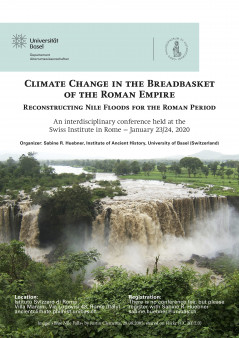Archived Veranstaltung
Conference
The importance of the Nile on Egypt’s agriculture, society, culture and political history can hardly be overrated. Since rainfall is almost non-existent in Middle and Upper Egypt, any changes in the annual Nile flood must have triggered an immediate response in Egyptian society, economy and politics. Moreover, the Nile river and its fertile flood plains did not only play a crucial role in the development of Egyptian civilization, but they also constituted one of the main pillars for the economic stability of the Roman Empire and helped to sustain its imperial expansion. The grain supply of the city of Rome and the Roman army was closely tied to the annual cycle of the Egyptian river. Reconstructing annual changes in the quality of the flood of the Nile is thus important not only for studying the immediately adjacent Egyptian society, but it also has implications of a larger scale, for a series of below-average Nile floods must have had serious political and socio-economic consequences for the entire Roman Empire.
Climate Change in the Breadbasket of the Roman Empire: Reconstructing Nile Floods for the Roman Period
An interdisciplinary conference held at the
Swiss Institute in Rome
Villa Maraini, Via Ludovisi 48, Rome (Italy)
January 23/24, 2020
Until now ancient historians studying the society and economy of Roman Egypt have hardly paid any attention to the flood quality in any given year. Moreover, our literary, epigraphic and papyrological sources offer only sparse evidence for exceptional years: the earliest consecutive records of Nile flood levels start in the 7th century CE recorded by the Islamic Nilometer in Cairo.
With new advances in the field of paleoclimatology, which offers an entirely new array of sources to ancient historians, there is hope that we will be able to reconstruct Nile flood data for the Graeco-Roman period, and develop collaborative methods of assessing the impact of climatic variability or change on ancient societies without oversimplifying their causal connections. At this conference we aim to discuss both human and natural proxy data in order to reconstruct summer Nile flooding during the Roman period from 30 BCE to roughly 700 CE.
Guests are welcome, there is no conference fee. Please register with Sabine R. Huebner (sabine.huebner@unibas.ch).
-----------------------------------------------
January 23, 2020
Session 1: The Nile over the longue durée (chair: Markus Stoffel)
14:30 – 15:00 Welcome and Introduction
15:00 – 15:30 Henry F. Lamb (Aberystwyth)
15:30 – 16:00 Cecile Blanchet (Potsdam)
16:00 – 16:30 Elena Xoplaki (Giessen)
16:30 – 17:00 Coffee
17:00 – 17:30 Judith Bunbury (Cambridge)
17:30 – 18:00 Response by Irene Soto Marín (Basel) // General Discussion
20:00 Dinner
January 24, 2020
Session 2: Historical case studies of Nile flood extremes during Roman times (chair: Irene Soto)
9:30 – 10:00 Anna Arpaia (Pavia)
10:00 – 10:30 Katherine Blouin (Toronto)
10:30 – 11:00 Sabine R. Huebner (Basel)
11:00 – 11:30 Coffee Break
11:30 – 12:00 Christopher Corona (Clermont)
12:00 – 12:30 Response by Elio Lo Cascio (Rome) // General discussion
12:30 – 13:30 Lunch
Session 3: Natural proxies for reconstructing Nile floods during the Roman period (chair: Sabine R. Huebner)
13:30 – 14:00 Matthieu Ghilardi (Aix-Marseille)
14:00 – 14:30 Markus Stoffel (Geneva)
14:30 – 15:00 Coffee Break
15:00 – 15:30 Kevin Anchukaitis (Tucson)
15:30 – 16:00 Response by Federico de Romanis (Rome) // General Discussion
Organisiert von
Prof. Dr. Sabine R. Huebner
Sprachen der Veranstaltung
English
Zusätzliche Informationen
Website der Veranstaltung
Kosten
CHF 0.00
